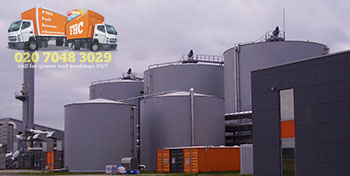Anaerobic digestion of organic and food waste is one of the methods for production of relatively clean energy. Waste to energy schemes in the UK have been in operation for a number of years, and have yielded worthwhile results. However, the efficiency of waste to energy programs depends on collection and processing of enough organic and food waste from households and commercial establishments. At the moment, plans to cut back on budget spending is pushing local councils in various regions of Great Britain to rethink and possibly downsize their municipal organic & food rubbish removal services. This however would mean that fuel for waste to energy plants will be in more limited supply, lowering such installations’ capacity to produce clean energy for local and regional needs.
The problem
 The main problem experienced by local councils is financial cuts. Limited local budgets are squeezing the available funds for removal and disposal of organic and food waste. Furthermore, some councils are actually thinking of scrapping the organic & food rubbish removal service altogether. The leader of UK’s Anaerobic Digestion Mr Dean Hislop has voiced out concerns that such cutback policies can jeopardise the entire nation’s anaerobic digestion waste to energy program.
The main problem experienced by local councils is financial cuts. Limited local budgets are squeezing the available funds for removal and disposal of organic and food waste. Furthermore, some councils are actually thinking of scrapping the organic & food rubbish removal service altogether. The leader of UK’s Anaerobic Digestion Mr Dean Hislop has voiced out concerns that such cutback policies can jeopardise the entire nation’s anaerobic digestion waste to energy program.
A possible solution
Instead of cutting back and discontinuing removal and disposal services for organic and food waste, local councils should actually encourage and educate local residents and businesses on the importance of separating food and organic waste from the stream as they are the main fuel for waste to energy treatment plants. In fact, better collection schedules and public awareness will allow for more waste input resulting in higher green energy output. This in turn will allow for local councils to reorganise their already limited budgets and free up much needed funds to be used in other areas.
The UK has a 50% legally binding recycling rate, so opportunities to invest a little to save a lot should not be passed by. It might appear that cutting back on food & organic waste collection and recycling saves money, but in reality it doesn’t as in the long term the missed benefits of waste to energy programs fuelled by organic waste will be felt hard by local communities. Effective food and organic waste recycling (backed up by local and national government efforts) is the only way to meet the existing capacity of waste to energy industries already operating in Britain. Sometimes simple things like stickers on household wheelie bins are enough to remind people that food and organic waste should be separated and made available for curb side collection.
Some facts about waste in UK
- 2 million tons of food is thrown out every year in UK, much of it quite edible;
- 20 to 40 percent of all food is rejected by supermarkets due to bad aesthetics;
- Waste generated in UK in one year could fill up Albert Hall, London in 2 hours;
- The UK uses about 500 million plastic bags every year, Wales reduced their use by 90%;
- 83% of perfectly good sofas go to recycling every year, if UK residents reused twice as many of their sofas, this would prevent 52 thousand tons of CO2 emissions;



